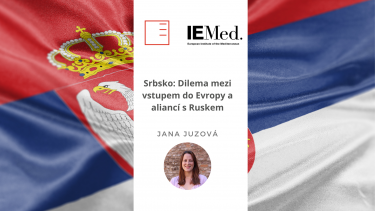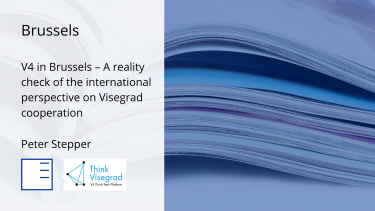IEMED | Serbia: The Dilemma between European Accession and Alliance with Russia
With Ukraine’s defence against Russia heading toward a stalemate in the second half of the year and increased pressure inside the EU to deliver on its promises to provide the country with needed financial and military support, Serbia’s ambiguous relationship with Russia and the West has been brought increasingly into the spotlight in 2023. The Serbian Progressive Party (SNS), ruling since 2012, and President Aleksandar Vučić have been responsible for continued democratic backsliding and have failed to align with the Union’s foreign policy during Serbia’s lengthy EU accession process, pushing the situation closer towards a tipping point in Serbia-EU relations. Senior researcher at EUROPEUM Institute, Jana Juzová, describes this in more detail in her article for the European Institute of the Mediterranean.
Zjistit víceREPORT | What future for QMV in Foreign and Security Policy?
The debate focused on the possible move to qualified majority voting in the EU's Foreign and Security Policy. The participants in the debate discussed the possible negative and positive aspects of the decision. The debate covered topics such as the fear of over-voting as a possible aspect of division within the Union or the ineffectiveness of the current consensus approach.
Zjistit víceREPORT | Jaká je budoucnost hlasování kvalifikovanou většinou v zahraniční a bezpečnostní politice?
Debata se zabývala možným přechodem k hlasování kvalifikovanou většinou v Zahraniční a bezpečnostní politice EU. Učastníci debaty diskutovali o možných negativních a pozitivních aspektech toho rozhodnutí. Debata pokryla témata jako například obava z přehlasování, jako možný aspekt rozdělení uvnitř Unie či neefiktovnost současného konsensuálního přístupu.
Zjistit víceWindsor framework and future EU-UK relations: Could personal diplomacy be the driving engine?
The United Kingdom has finally found common ground with the EU regarding the provisions of the Northern Ireland Protocol. The current British prime minister can take credit for what three prime ministers failed to do before. So does Britain's foreign policy stand on a shoulder of one man's personal connections? The question answered our Katřina Horáková in her blog.
Zjistit vícePOLICY PAPER | QMV in CFSP: Impending necessity or resurfacing utopia?
Miroslava Pisklová writes about a discussion on potential broadening of the qualified majority voting (QMV) system to more of the remaining policy areas in the Council of the EU in which it is not yet used, namely the EU´s Common Foreign and Security Policy (CFSP) that has recently gained momentum. This publication aims to analyse the advantages and disadvantages of introduction of the QMV in CFSP of the EU with a focus on the potential impact on smaller member states.
Zjistit víceVISEGRAD/ISIGHT: Czechia and Slovakia lead the ways
Our senior researcher Jana Juzová wrote an article for VISEGRAD/INSIGHT on "The Czech Republic and Slovakia in the lead". Since July, the Czech Republic has held the presidency of the EU Council and Slovakia the presidency of the Visegrad Four. Although the V4 is now in the shadow of Czech and Slovak foreign policy, this does not mean that it is less important or that it is falling apart. However, the V4 crisis triggered by Hungarian Prime Minister Viktor Orbán may be an opportunity for the Czech Republic and Slovakia to determine the direction of the Visegrad Four.
Zjistit víceINVITATION: Asylum and migration policy: Danish and Czech perspectives
On behalf of EUROPEUM Institute for European Policy we would like to cordially invite you to a discussion titled ''Asylum and migration policy: Danish and Czech perspectives''. The event is organized in cooperation with the Embassy of Denmark in Prague. The discussion will take place on Thursday, April 21, 2022 from 16:00 at the European House (Jungmannova 745/24, 110 00) and it will be also live-streamed on our Facebook page.
Zjistit více
Policy Paper: Time to Redefine the Terms and Conditions of the Transatlantic Relationship? – 2021 Transatlantic Policy Forum in Review
On November 18-19, 2021, the fourth edition of the Transatlantic Policy Forum took place. It was hosted by EUROPEUM Institute for European Policy in partnership with the German Marshall Fund of the United States and the International Republican Institute (IRI), supported by the International Visegrad Fund, Friedrich Naumann Foundation, and the Ministry of Foreign Affairs of the Czech Republic. The aim of this Policy Paper is to provide a summary and analysis of the discussions that took place, while respecting the Chatham House rule and thus preserving the anonymity of the participants. This analysis aims to highlight and elaborate on the main findings of the participants.
Zjistit více
Policy Paper: Czech-Russian Escalation as a Case of Deeper EU-Russia Crisis: Time for a United and Credible Action
Pavel Havlíček, an analyst at the AMO Research Centre, has written a policy paper for our Brussels office on the Czech-Russian escalation as a case of a deeper crisis between the EU and Russia. In his article, he also makes recommendations for the European Union. The text was written during a research stay in Brussels, which was facilitated by our Brussels office with the support of the Ministry of Foreign Affairs of the Czech Republic.
Zjistit více PDFPolicy Paper: V4 in Brussels – A reality check of the international perspective on Visegrad cooperation
Peter Stepper, Senior Research Fellow, Head of Euroatlantic Program for Institute for Foreign Affairs and Trade wrote a policy paper titled "V4 in Brussels – A reality check of the international perspective on Visegrad cooperation".
Zjistit více PDFStaroměstské náměstí 4/1
Praha 1 - Staré Město
110 00
tel.: +420 212 246 552
email: europeum@europeum.org
https://www.europeum.org








